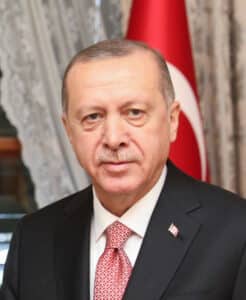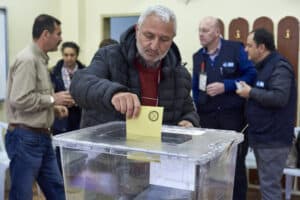Some irregularities seem to have occurred in the registration of votes for the upcoming local elections in Turkey. Members of the opposition Republican People’s Party (CHP) have stated in Parliament that the oldest registered voter for the 31 March elections is the 165-year-old Ayse. Along with her, more than 6,000 other voters over the age of 100 were registered to vote. Other opposition parties have joined the CHP in an attempt to get the Supreme Electoral Board (YSK) to investigate these issues.
Changed numbers
Along with Ayse, 6,389 centenarians were registered as voters. Interestingly, according to an inquiry by the CHP, none of their names appeared in the voter lists of the 14 previous elections with which the current voter lists were compared. This means that these voters were registered as first-time voters. Furthermore, it was reported that more than 1,000 voters had been registered at one apartment and, as such, address. Adding on are the voters registered at empty buildings, construction sites and stories of buildings that do not exist, according to BBC. However, it is not clear what the numbers concerning these registrations are. Last but not least, some regions in the country saw a substantial rise in registered voters. In one particular district, this rise amounted up to 95%, from 8,379 to 16,401. Slightly lower figures were seen in other districts as well.
On the other hand, there was also an amount of voters that had been removed from the current voter list. Of the 923,796 removed from the lists compared to the voter list of June 2018, 233,937 had deceased since then, 206,630 have entered military service and for that reason are not allowed to vote, and 43,278 have been convicted and have thus also lost their right to vote under Turkish law. Of the remaining 439,951 deregistered voters, 375,107 have disappeared because their address has not been recorded in the central civil registration system. Of the 64,844, the reason for their deregistration has not been found.
Suspicion on AKP and YSK
Opposition party CHP has conducted the research into the voter list discrepancies. However, after the results had been made public, the Peoples’ Democratic Party (HDP) and İYİ Party joined CHP in their demand for an investigation into the way the voter lists were put together, and why the discrepancies could occur. It has been speculated that president Recep Tayyip Erdogan’s ruling Justice and Development Party (AKP) is behind the registration changes: CHP and HDP have claimed that the changes have mostly taken place in regions where the AKP had lost some votes in the previous elections of June 2018. However, AKP has denied any involvement with the voter list discrepancies. Instead, an official from the party said, these changes were made to have a bad impact on the party, and that it had filed a complaint about the voter registrations itself.
Following the statements by CHP and other opposition parties, YSK has given a reaction in which it distances itself from the discrepancies in the voter lists, and has corrected some of the mistakes that were reported. For example, after looking into the large amount of centenarians and finding out only seven of them were actually alive, YSK claims it has removed the remaining 6,382. Furthermore, YSK has stated that it has reached out to the people of whom it had no address, in order to be able to register them after all.
However, these actions do not seem to take away the suspicion that rests on the YSK. A few days before mentioning its research into the voter discrepancies, CHP stated that it did not trust the YSK, because of the alleged ties between the election board and the AKP. CHP-leader Kemal Kılıçdaroğlu has expressed his distrust in the YSK, saying that it “has become pro-government. It does not make any decisions in accordance with the law. It cannot because it lacks the power. The power is at the [Presidential] palace.” YSK denied this claim and said that no political party, not even the ruling AKP, has access to its “digital infrastructure.”
A tense election period
The announcement of the voter discrepancies is one of many clashes between the AKP and opposition parties, mainly the CHP, that are a distinct part of the election period that Turkey has entered and will remain in until after 31 March. The comments and self-conducted examination of the voter lists by CHP and other opposition parties have shown the lack of trust in the YSK, as well as in the AKP. However, the findings remain to be nothing more than allegations, since at the moment it cannot be proven that the YSK and AKP are wilfully behind them. However, given the reputation that most of all AKP has in terms of preparing for elections, the allegations and distrust remain, setting a tense scene for the upcoming local elections. Especially now AKP may lose some of its electorate, due to resentment over the tough economic circumstances that Turkey is in at the moment, there is a lot at stake in the outcome for all participating parties.
Sources: Hurriyet Daily News, Hurriyet Daily News II, Hurriyet Daily News III, BBC
Photo: Randam/Wikipedia



